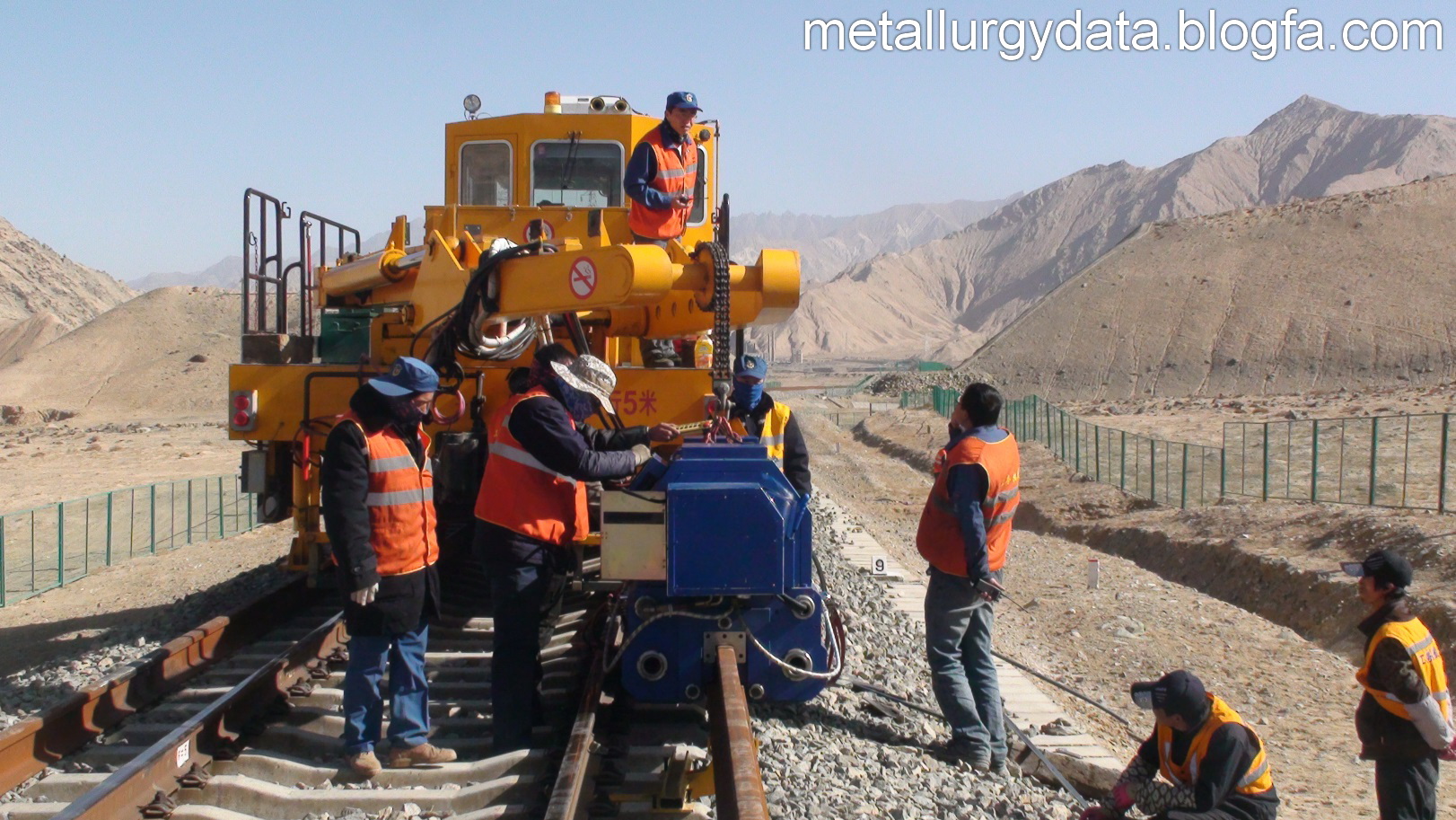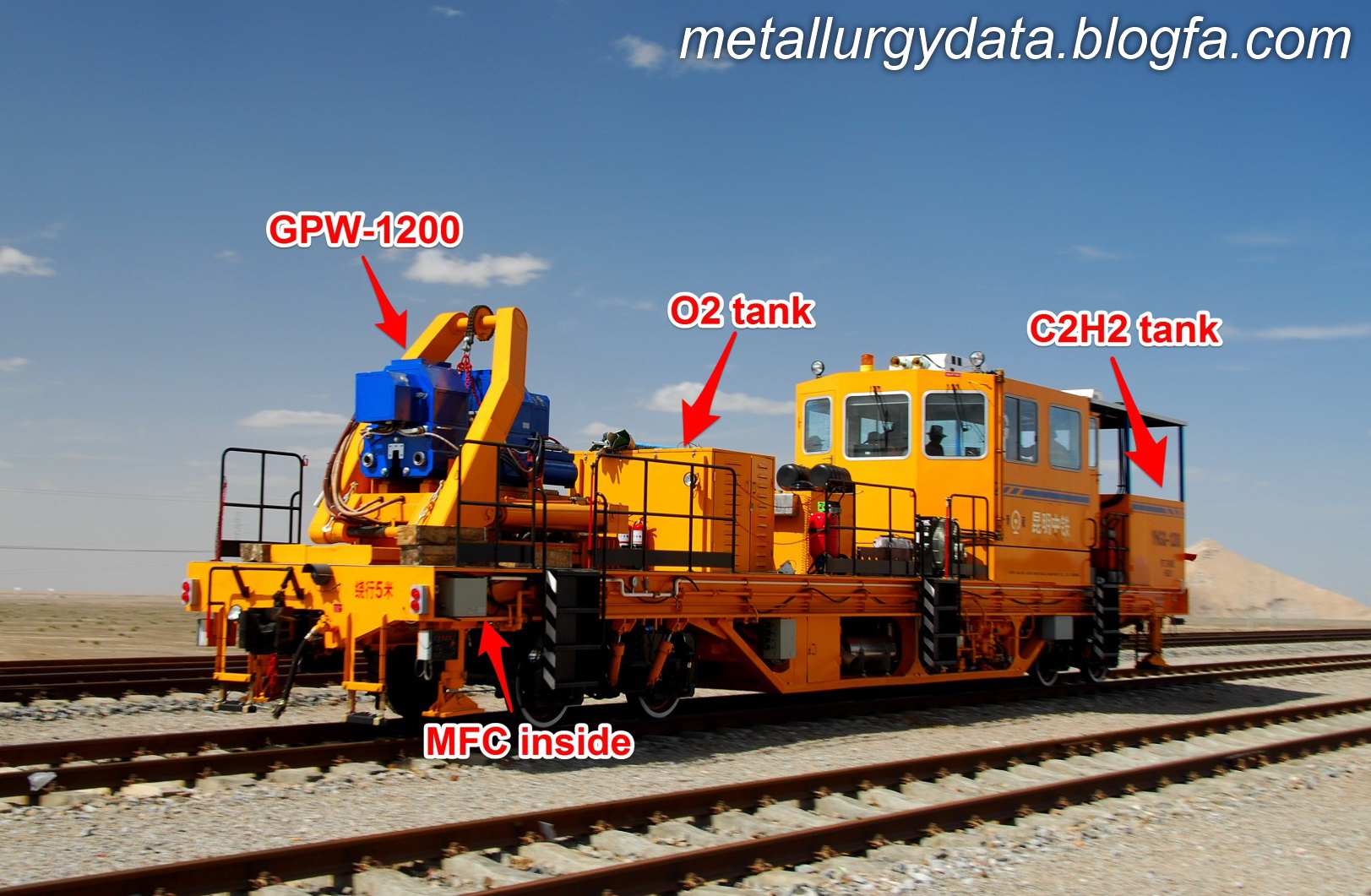Touch the Sky at 4611 Meters High: Mass Flow Control for High-Speed Rail Welding
Today,
“Alicats in the Wild” takes us deep into the Chinese interior, where a
novel welding method is revolutionizing the speed and quality of
high-speed railway construction. This story comes courtesy of Shanghai
Hua Xie, one of Alicat’s distributors for China.
High
in the Qinghai-Tibetan Plateau of western China lies the Sky Road, the
highest railway in the world. At altitudes as high as 4611 meters, a
remarkable gas pressurized welding machine, manufactured by Chengdu Da
Cheng Communication Tech Company, Ltd., uses precision mass flow control
and pneumatics to pressure weld each rail section on site. This
innovative technology ensures very smooth and secure rail to rail
transitions, which is especially ideal for meeting the stringent
requirements of China’s flourishing high-speed rail industry.
Pneumatic Gas Pressurized Welding for Railways
The GPW-1200 gas pressurized welding machine being assembled at Chengdu Da Cheng.
The
Qinghai-Tibet Railway, called the Sky Road by locals, is constructed
with high-carbon steel rails whose great strength and hardness require
welding temperatures as high as 1300°C. In contrast to slow and
dangerous traditional thermite welding processes, Da Cheng’s GPW-1200
gas pressurized welding machine yields higher quality welds in only 20
minutes. To accomplish this, the machine itself grasps both rails and
hydraulically forces them together to ensure precise alignment during
the welding process. Then the GPW heats the rail joint to 1300¬°C with
an acetylene-oxygen flame mixed at an exact ratio of 1:1. After 6
minutes, the welding flame extinguishes, and pressure is maintained on
the fusing rail ends as they cool. The GPW then polishes and verifies
the alignment and smoothness of the new rail joint. A dedicated
engineering train carries the GPW from joint to joint every 500 meters,
making the entire process very efficient.
Da Cheng’s GPW-1200 railway pneumatic pressure welding machine in operation in Tibet.
The
quality of these railway welds rests upon the stable control of the
acetylene-oxygen welding flame and the precise maintenance of the mixed
gas composition at a 1:1 ratio. In its original design, the GPW used
rotameters to monitor the flow of the gases to the welding flame.
However, because rotameters measure volumetric flow, which changes as
atmospheric pressure and temperature change, Da Cheng found that flow
readings became inaccurate as the altitudes of the GPW’s operating sites
increased. On account of this, Da Cheng turned to thermal mass flow
control. However, thermal mass flow controllers from multiple
manufacturers all displayed inconsistent flow control that yielded
unstable welding flames and poor quality welds. In addition, the
10-minute-long warm-up times of these thermal mass flow controllers
slowed down the welding process significantly.
Fast Mass Flow Control for Railway Welding
Alicat high-flow mass flow controllers provide stable control for acetylene and oxygen welding gases.
It
was at this point that Chengdu Da Cheng turned to Shanghai Hua Xie
Automation Equipment Company, Ltd., one of Alicat Scientific’s
distributors for China. Hua Xie recommended the installation of Alicat’s
high-flow mass flow controllers (MCR Series), which utilize laminar
differential pressure-based measurement technology and employ
near-frictionless rolamite proportional control valves. With control
speeds of less than 100 ms, these mass flow controllers yielded
precision control of the gas flow rates and therefore stable welding
flames. Because Alicat mass flow controllers also measure pressure and
temperature in real time, they provided highly accurate mass flow
readings regardless of the working altitude or ambient temperature of
the GPW’s work site. With no thermal element and thus no warm-up time,
these mass flow controllers improved the GPW’s efficiency, reduced Da
Cheng’s scrap metal rate and shortened the overall construction time by
30%. Furthermore, Alicat’s many on-board gas calibrations means any
controller can be made to control acetylene or oxygen without the need
for recalibration, which simplifies Da Cheng’s stocking requirements.
Alicat mass flow controllers mounted on Da Cheng’s GPW-1200′s engineering train in Tibet.
With
more than 20 GPW-1200 gas pressurized welding machines ordered in just
the past few months, Chengdu Da Cheng Communication Tech Company is
poised to revolutionize the way high-speed rail systems are built and
maintained, here in China and around the world. In the future, these
systems will be built more rapidly and with greater quality on account
of Da Cheng’s extraordinary GPW and the fastest mass flow controllers in
the world.

به لطف خدا،metallurgydata کاملترین و پر بازدیدترین(آمار حقیقی و قابل باز دید)مرجع اطلاعات مواد و متالورژی با بیش از 1300 عنوان ،شامل هزاران متن،کتاب،تصویر،فیلم تخصصی در خدمت شما می باشد.پاسخ به سئوالات و مشاوره رایگان با تجربه20 سال تحقیق و مطالعه در شاخه های مختلف متالورژی.
آماده معرفی طرح ها و واحدهای صنعتی موفق و نو آور بصورت ویدئو و متن در این مجموعه هستیم.
http://kiau.ac.ir/~majidghafouri
09356139741:tel
ghfori@gmail.com
با عرض تقدیر و تشکر از توجه و راهنمایی کلیه علاقمندان
با ctrl+f موضوعات خود را در متالورژی دیتا پیدا کنید
پیامرسان تلگرام: metallurgydata@
طبقه بندی موضوعی
-
متالورژی
(۵۴۶) -
متالورژی پودر
(۸۱) -
ریخته گری،مدلسازی،قالبگیری،سیستم راهگاهی،ایمنی
(۱۲۹) -
جوشکاری،لحیم کاری
(۹۵) -
ترمودینامیک،استخراج
(۳۶) -
فیلم ریخته گری،جوشکاری ...
(۹۳) -
سرامیک ، دیرگداز،کامپوزیت،شیشه
(۱۳۷) -
نانو،مواد پیشرفته،چوب،پلاستیک
(۲۴۵) -
فلزات
(۲۵۷) -
پوشش،آبکاری ،خوردگی،طلا
(۷۳) -
مقالات ISI
(۲۵) -
فیلم متالورژی
(۸۹) -
ساخت کوره و انرژی
(۸۵) -
شکل دادن فلزات ، آهنگری
(۷۷) -
هنر فلزات و مواد
(۲۶۰) -
نابجایی،استحاله فازی
(۱۸) -
تاریخ فلزات
(۴۹) -
آموزش زبان تخصصی متالورژی صنعت فولاد
(۱) -
متالوگرافی،خواص مکانیکی
(۶۷) -
عملیات حرارتی _ آنالیز مواد
(۷۵)
کلمات کلیدی
متالورژی
مواد
مواد پیشرفته
نانو
نانو تکنولوژی
ریخته گری
جوشکاری
پوشش
سرامیک
ایمنی
متالورژی پودر
فولاد سازی
سرامیک پشرفته
شکل دادن
فیلم
انرژی پاک
تاریخ فلزات
مهندسی مواد
شکل دهی فلز
هنر
فلز کاری
کوره القایی
هنر فلزات
فیلم متالورژی
نانو امولسیون
کامپوزیت
انرژی خورشیدی
متالوگرافی
متالورژی دیتا
هنر فلز کاری
بایگانی
- دی ۱۴۰۱ (۱)
- دی ۱۴۰۰ (۱)
- آذر ۱۴۰۰ (۱)
- آبان ۱۴۰۰ (۱)
- مهر ۱۴۰۰ (۱)
- اسفند ۱۳۹۹ (۱)
- بهمن ۱۳۹۹ (۳)
- دی ۱۳۹۹ (۱)
- مهر ۱۳۹۹ (۲)
- مرداد ۱۳۹۹ (۲)
- تیر ۱۳۹۹ (۲)
- خرداد ۱۳۹۹ (۳)
- بهمن ۱۳۹۸ (۴)
- دی ۱۳۹۸ (۲)
- آذر ۱۳۹۸ (۱)
- مهر ۱۳۹۸ (۳)
- شهریور ۱۳۹۸ (۳)
- مرداد ۱۳۹۸ (۳)
- تیر ۱۳۹۸ (۲)
- خرداد ۱۳۹۸ (۴)
- ارديبهشت ۱۳۹۸ (۴)
- فروردين ۱۳۹۸ (۳)
- اسفند ۱۳۹۷ (۱)
- بهمن ۱۳۹۷ (۳)
- دی ۱۳۹۷ (۲)
- آذر ۱۳۹۷ (۲)
- آبان ۱۳۹۷ (۱)
- مهر ۱۳۹۷ (۴)
- شهریور ۱۳۹۷ (۴)
- مرداد ۱۳۹۷ (۳)
- تیر ۱۳۹۷ (۳)
- خرداد ۱۳۹۷ (۲)
- ارديبهشت ۱۳۹۷ (۸)
- فروردين ۱۳۹۷ (۴)
- اسفند ۱۳۹۶ (۵)
- بهمن ۱۳۹۶ (۳)
- دی ۱۳۹۶ (۵)
- آذر ۱۳۹۶ (۶)
- آبان ۱۳۹۶ (۵)
- مهر ۱۳۹۶ (۶)
- شهریور ۱۳۹۶ (۸)
- مرداد ۱۳۹۶ (۵)
- تیر ۱۳۹۶ (۵)
- خرداد ۱۳۹۶ (۵)
- ارديبهشت ۱۳۹۶ (۱۲)
- فروردين ۱۳۹۶ (۸)
- اسفند ۱۳۹۵ (۷)
- بهمن ۱۳۹۵ (۹)
- دی ۱۳۹۵ (۷)
- آذر ۱۳۹۵ (۸)
- آبان ۱۳۹۵ (۸)
- مهر ۱۳۹۵ (۹)
- شهریور ۱۳۹۵ (۱۲)
- مرداد ۱۳۹۵ (۸)
- تیر ۱۳۹۵ (۱۵)
- خرداد ۱۳۹۵ (۱۷)
- ارديبهشت ۱۳۹۵ (۱۷)
- فروردين ۱۳۹۵ (۸)
- اسفند ۱۳۹۴ (۹)
- بهمن ۱۳۹۴ (۹)
- دی ۱۳۹۴ (۹)
- آذر ۱۳۹۴ (۱۲)
- آبان ۱۳۹۴ (۱۰)
- مهر ۱۳۹۴ (۹)
- شهریور ۱۳۹۴ (۹)
- مرداد ۱۳۹۴ (۱۵)
- تیر ۱۳۹۴ (۱۷)
- خرداد ۱۳۹۴ (۲۱)
- ارديبهشت ۱۳۹۴ (۱۹)
- فروردين ۱۳۹۴ (۱۷)
- اسفند ۱۳۹۳ (۲۰)
- بهمن ۱۳۹۳ (۱۸)
- دی ۱۳۹۳ (۲۰)
- آذر ۱۳۹۳ (۲۱)
- آبان ۱۳۹۳ (۲۱)
- مهر ۱۳۹۳ (۲۰)
- شهریور ۱۳۹۳ (۲۳)
- مرداد ۱۳۹۳ (۲۲)
- تیر ۱۳۹۳ (۲۱)
- خرداد ۱۳۹۳ (۱۵)
- ارديبهشت ۱۳۹۳ (۲۰)
- فروردين ۱۳۹۳ (۱۰)
- اسفند ۱۳۹۲ (۱۵)
- بهمن ۱۳۹۲ (۱۹)
- دی ۱۳۹۲ (۱۷)
- آذر ۱۳۹۲ (۲۰)
- آبان ۱۳۹۲ (۱۸)
- مهر ۱۳۹۲ (۱۳)
- شهریور ۱۳۹۲ (۱۱)
- مرداد ۱۳۹۲ (۷)
- تیر ۱۳۹۲ (۸)
- خرداد ۱۳۹۲ (۸)
- ارديبهشت ۱۳۹۲ (۸)